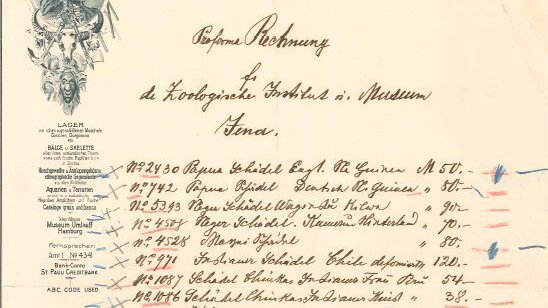
Published: | By: Axel Burchardt
Source article
A scalp from Namibia and skulls from Tanzania and Papua New Guinea: these are examples of human remains from University of Jena collections that found their way to Germany during the colonial period. Extensive research has been necessary to uncover the precise origins and history of these human remains, as identification is nearly always difficult and labour-intensive. The University of Jena has been involved in such provenance research for years.
“Friedrich Schiller University is well aware of its responsibility for its collections and therefore makes every effort to clarify the origins of these objects carefully and comprehensively,” says University President Prof. Walter Rosenthal. “We are focusing first on human remains, which do not belong in an exhibition, but rather in the care of descendants.”
To this end, Prof. Rosenthal has therefore deployed the working group “Koloniales Erbe und rassismuskritische Bildungsarbeit” (Colonial Legacy and anti-racist Educational Work) to study this topic, starting this semester. The group includes historians Joachim Bauer and Stefan Gerber, biology educationalist Uwe Hoßfeld and Archaeologist/Anthropologist Enrico Paust, and receives support from collection staff and other areas of the university.
The team of experts has recently produced new results, which it has published under the title “Ernst Haeckels koloniale Schädel” (German only). Using eight skulls from the former Osteological Collection and the Phyletic Museum as examples, the publication shows the routes taken by such objects from collections in the 19th and 20th centuries, as well as the possibilities and limits of reconstructing their provenance a century later.
Intensive research needed on each collection item
The publication is based on a recently completed research project in the field of cultural property and collections from colonial contexts, which was funded by the German Lost Art Foundation (Deutsches Zentrum Kulturgutverluste). In this interdisciplinary project, the specific provenance of eight human skulls from the Haeckel estate and the Osteological Collection was investigated in detail. Seven of these skulls were found in the collections after studying the files and were anthropologically measured and recorded. The researchers also established that Ernst Haeckel had purchased two skulls from the natural history trader, J.F.G. Umlauff, in Hamburg. However, despite intensive work on source material, it could not be conclusively clarified how the skulls of a Papuan and a Massai had come to Umlauff. The current whereabouts of the Massai skull bought by Haeckel also remained unclear, as it has so far not been located in the university’s collections.
Outstanding questions remain
With regard to the six skulls from the Osteological Collection, it has been possible to identify for all of them an entry into the collection between 1930 and 1935 under the professorship of Hans F. K. Günther, later called “Race Günther” for his advocacy of scientific racism and eugenics. For three skulls, it cannot be established exactly how they came to Jena. However, based on the previous owners, who have been identified – the Governor of German East Africa, Gustav Adolf Count of Goetzen, and the painter Wilhelm Kuhnert – it is likely that there is a connection with the Maji Goertzen Rebellion. The three Papuan skulls can be traced to a purchase from the Umlauff firm, as well as a gift from the Kaiser Wilhelm Institute. Only for one skull has it not been possible to specify the origin further.
The findings obtained in this project serve as a methodological basis for a future comprehensive reappraisal of the University of Jena collections. The skulls investigated in the study are to be returned to their countries of origin. For this purpose, the Federal Foreign Office and representatives of the countries involved have been notified.
Original publication:
Enrico Paust, Carlies Maria Raddatz-Breidbach, Uwe Hoßfeld, Joachim Bauer, Stefan Gerber: Ernst Haeckels koloniale Schädel, Jenaer Archäologische Forschungen, issue 8, Jena 2021, 4.50 euros. (German only)
07743 Jena Google Maps site planExternal link
Bibliotheksplatz 2
07743 Jena Google Maps site planExternal link